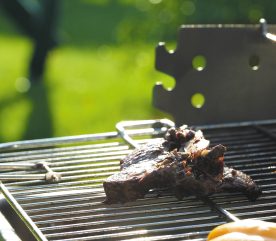Barbequing in the Garden
Grilling meals for friends is a favorite summertime ritual-the perfect way to show off your garden. Whether you use a portable grill on the deck or patio or build a permanent barbecue from brick or stone, follow these tips for the best experience.

Choose the right location
Choose the right location. Don’t put the barbecue so close to the house that smoke wafts through the doors or windows. Set the grill in a quiet corner of the landscape and make it accessible to the kitchen by a level, paved path-that way, it will be easy to transport food and supplies on a butler’s table or cart.
Stone gives a rustic look
Stone gives a rustic look to a barbecue. Sandstone is an excellent choice because it withstands heat well. If you use limestone, basalt, shale, or granite, line the firebox with bricks to protect these vulnerable stones from excess heat.
Don’t be stingy
Don’t be stingy when you buy a portable barbecue, but don’t buy more than you need. Gas grills with electric ignitions are fast and easy to use, but they are vulnerable to moisture and should be kept in a sheltered spot or protected with a waterproof cover when not in use.
If you use bricks
If you use bricks to build a barbecue, make sure they have been fired at a high temperature. Well-fired bricks make a ringing sound when tapped with a hammer.
Add real wood-smoke flavour
Add real wood-smoke flavour to your favourite BBQ recipes with a handful of green twigs from garden trees or herbs.Toss them onto the fire just before you start barbecuing. Apple, cherry, and hickory twigs work well, and rosemary, sage, tarragon, bay, and thyme clippings add a special flavour.
Keep smoke out of your eyes
Keep smoke out of your eyes. Place the grill so it’s protected from the prevailing wind, but choose a semipermeable hedge as a windbreak. (A solid fence or wall actually increases air turbulence on the downwind side.) Be sure to keep the grill at a safe distance from anything flammable.
Keep the grate dry
Keep the grate dry. When rainwater mixes with charcoal ashes, it forms lye, a powerful corrosive solution. Keep a charcoal grill covered between uses and dump out ashes every few times you use it. Don’t put them in the garden, because they will kill nearby plants.



